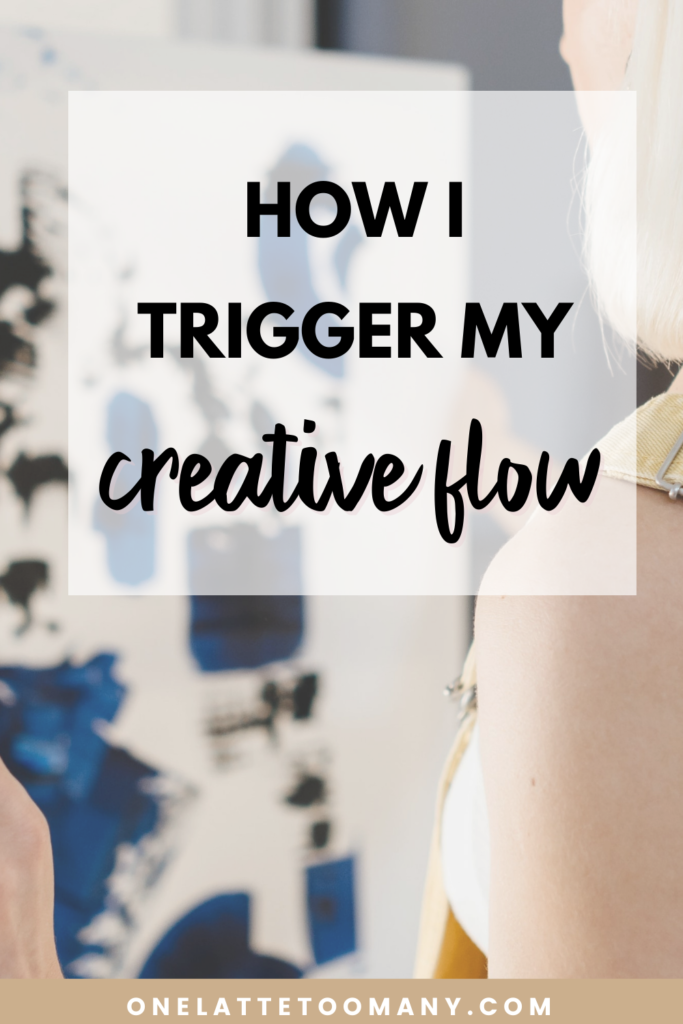Being in a creative flow is something quite special, right?
It has this mysterious, almost magical thing to it.
It’s like you can’t really control your creativity and it just kind of “overcomes” you.
However, especially as a creative entrepreneur, having to put out all of this content and products, you need a whole lot of inspiration and creativity.
Here are some tips to stimulate your creativity and activate your creative flow whenever you need it!

Related Reads:
- 8 Genius Ways to Break Your Bad Business Habits
- 3 Key Mindset Shifts To Stop Letting Fear And Anxiety Sabotage Your Success
- The Secrets Of The Law Of Attraction
- How I Changed My Money Stories And Created An Abundance Mindset In My Business
Tip #1: Welcome & capture ideas with open arms
In the book “Big Magic“, Elizabeth Gilbert describes ideas as these mystical creatures that interact with you and try to get you to commit to their idea. It will seem like the universe is giving you all these hints to remind you to follow through with this idea.
However, when these mystical creatures realize that you aren’t committed enough to make this idea happen, they will eventually give up and find someone else to commit to their idea.
And this explains why sometimes you see other people come up with the exact same idea as you have, even though it’s sometimes such a specific and niched idea that it seems almost impossible that somebody could come up with something so similar.
So, in order to stimulate your creativity, try to be genuinely open to new ideas. Create the time and space to really listen and let new ideas come to you. And when they do, capture every one of them, good ones and bad ones, and write them all down.
I personally have a “brain dump book”, that I don’t use for journaling. but specifically to get everything out of my brain and onto paper.
Most of these are random to-do’s, things I can’t forget, and some worries and concerns I have, and after my brain is ‘cleaned up’ and I’m able to think clearly again, I turn the page and literarily write down ‘Do I have any new ideas today?’ and then I just let my mind answer that question. I just let it write freely and come up with whatever it wants.
Sometimes it will come up with a thing I need to purchase to make my life easier, other times it will be an interesting blog post topic I want to write about, and other times, it might be a new business idea or strategy that could be interesting to try.
I don’t care if it’s a good or a bad idea, I just try to put some ideas on paper every single day.
Because I believe that creativity is like a muscle that you can train.
The more you use it, the easier it will become to let ideas come to you.
Or as Elizabeth Gilbert says in her book, these mystical creatures know that you’re somebody who takes ideas seriously, so they will be more likely to want to collaborate with you.
Don’t judge your ideas too much in the beginning, just write them down, even though you know they are bad ones. Because for every 20 bad ideas, there will be one brilliant idea. The point is just to make a habit of generating new ideas and capturing them.
Tip #2: Don’t be afraid to think out of the box and try something completely different
In business terms, they often speak about the Red Ocean versus Blue Ocean and this basically means that in saturated markets with lots of competitors, it’s very difficult to become the leader and have a big enough piece of the pie in order to be successful.
It’s like an ocean where there are just too many sharks that are searching for limited food that is available.
However, if you can think out of the box and find for example a specific audience that hasn’t been served yet and adapt your product or service in such a way that it makes it unique and ideal for that specific audience, you can reach the “blue ocean”.
In a blue ocean, you are the only one, so it’s extremely easy to find food. In other words, it’s way easier to become the leader and have a big market share because there isn’t anyone like you that is offering what you are offering, which helps you to become the “default”.
So really try to let your creativity flow freely and don’t be afraid to be “different” than everything else that is already out there.
Do a competition analysis and find a gap that you can fill in an authentic and unique way.
Tip #3: Creativity is something that needs to be in balance
If you’re just creating, creating, creating, you’re always putting things out, but you have to make sure to also take things in, in order to keep the balance.
In other words, in order to be creative, make enough space to let yourself get inspired.
If you think about these moments where you had a genius idea, it was probably triggered by something.
Maybe it was triggered by an interesting conversation you had with someone. Maybe it was an inspiring book you read or a song you listened to,…
So, make sure to have at least a few hours every week that you can use to get inspired and restore your creative balance.

Tip #4: Organize “carte blanche days” to activate your creative flow
In our businesses, we often have everything planned out to the very minute. And sometimes all this structure and rigid planning doesn’t provide enough space for creativity and spontaneity.
So, something that I started doing recently, is blocking off 4 hours every week where I have complete creative freedom.
During these 4 hours, I give myself the permission to do or create whatever I feel like doing or creating.
And this changed everything for me… I created some of my best work during these hours.
Sometimes I start writing about a certain topic I have been curious about for a while, other times I make a new Notion Dashboard or start brainstorming about this new idea I had in the shower yesterday.
Creativity isn’t something that likes to be limited and put in boxes because it’s a free spirit.
I got this idea from an Australian software company called Alassian, which organizes something called an ‘Autonomy Day’ every quarter where for 24 hours, their engineers can work on whatever they want.
Alassian believes that everyone naturally has the desire and intention to be innovative and create new, cool things. So, as a company, they just get out of their engineer’s way to give them the right environment to let them be creative and innovative.
This autonomy day, which starts at 3 pm and then continues the next day from the morning until 3pm, ends with a company party with beers and snacks. The engineers also give a presentation about everything they came up with during these 24 hours.
And some of them get so excited about these projects that they end up doing voluntarily an all-nighter just to finish this project they are so passionate about.
And every single time, in these 24 hours so many different bugs get fixed, new product ideas get proposed and so much progress gets made just by giving them this creative freedom.
So I started doing the same in my business because I know that I need a lot of structure and strategy in order to thrive, but simultaneously I like to balance this out with these carte blanche hours to inject some spontaneity, and just pure creative freedom to get out of my own way and let myself create something I feel genuinely excited about. And this has helped me tremendously with activating my creative flow.
Tip #5: The beginning is “heart work”, not “head work”
As Rick Rubin says “the beginning is “heart work”, not “head work”. The head comes in later to look at what the heart has presented and to organize it. But the initial inspiration comes from a different place, and it’s not the head.”
And I totally agree with this. I try to keep them as separate as possible because I feel like using both sides of my brain simultaneously JUST DOESN’T WORK.
So when I try to put my creative ideas that are still in my head, in a structured and organized way in an empty word document, it just limits my creativity so much.
What I like to do to keep them separate is using pen and paper to really write everything down what is going on in my head in a super chaotic way and after, I will take those piece of paper, and then structure and organize this information and transfer it to my information management system.
So try to do the same and see if this also works for you. Take a piece of paper and write down everything that’s going on in your mind without worrying about structure. And then, organize these ‘words vomits’ in a more structured way.
When I see a blank Google Doc Page and I know I have to write this 2000-word blog post, it gives me anxiety. It seems daunting and I feel that every sentence I write has to be perfect. So, when I use a piece of paper, it doesn’t seem that way, because for me I see it more as a quick brainstorm, but as I get into it, I almost always end up writing my whole blog post on paper.
And then, in the second phase, I just make my sentences more beautiful, structure them better and do the finishing touches, but basically, 80% of the work is already done.
Tip #6: Take your natural peak hours into account in order to active your creative flow
if you are a die-hard morning person, and you organize your intense brainstorming sessions at 9 pm, it probably won’t be as productive.
So, become aware of the hours in the day when you naturally have the most energy and use these for your most creative tasks.
You will notice that you will come up with so much more quality ideas than when you would do when organizing creative sessions during moments when you’re in an energy dip.
That rounds up my 6 tips to stimulate your creative flow.

Related Reads:
- 8 Genius Ways to Break Your Bad Business Habits
- 3 Key Mindset Shifts To Stop Letting Fear And Anxiety Sabotage Your Success
- The Secrets Of The Law Of Attraction
- How I Changed My Money Stories And Created An Abundance Mindset In My Business
Let’s Chat!
What do you do to get your creative juices flowing?

I definitely needed to read this today! Thanks for sharing!
I absolutely love Elizabeth Gilbert’s book, you summarised it so well. I love all these super useful tips. Thank you for sharing your wisdom!